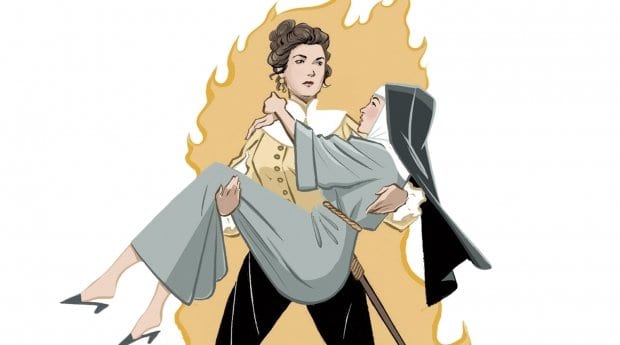Born in 1670, Julie d’Aubigny (aka La Maupin) had a voice that was as alluring as her sword was deadly, and thus armed she cut her way across late 17th-century France, seducing men and women alike. The more I read of her, the more I’m convinced that this woman — who started breaking conventions and doing as she liked when she was just 14 — is my favourite queer woman in history.
Julie’s father, Gaston, seems to have thought that, irrespective of gender, everyone should know how to defend themselves on the perilous streets of Paris. Being secretary to the Comté d’Armagnac, the man charged with the education of Louis XIV’s pages, Gaston was able to give Julie much the same education as that received by the pages, and he personally taught her how to handle a sword.
Julie’s adventures began at age 14 or 15 when she seduced the count, who introduced her to high society and the royal court. To hide the affair, he arranged for her to marry Monsieur Maupin. After about a year, Maupin was given an administrative position outside Paris. It’s likely the count, fed up with Julie’s antics, arranged the position, hoping Julie would leave with her husband.
Instead she stayed, and with her husband absent and the count distancing himself, she unleashed violence and her rabid libido upon a confused Paris. When her lover, a man named Sérannes, was accused of killing someone in a duel, they both fled to Marseille, where they made a living singing in taverns and giving duelling exhibitions. Julie started dressing as a man, but not to hide her gender; on the contrary, she flaunted the contrast between her gender and attire to draw larger crowds.
Julie soon grew bored of Sérannes. Tall, dark and athletic, with lily-white skin, comely breasts and curly brown hair, she decided that what would suit her best was a blonde girl, who would contrast charmingly with her own darker colouring.
Julie found such a girl, and when the girl’s aghast parents sent her off to a convent in Avignon, Julie followed. She, too, entered the convent and soon arranged their breakout by hiding a dead nun’s body in the blonde’s bed and setting the convent afire so they could escape in the turmoil.
She soon ditched the blonde and, fleeing a death sentence, travelled from town to town before heading back to Paris in the hope of finding a career onstage. Along the way she met a group of squires, got into a disagreement with them and fought them, beating them all and driving her sword through one man’s shoulder and out the other side. The man was the son of the Duke of Luynes, and this encounter was the beginning of a long sexual relationship between him and Julie.
Julie tracked down the count and convinced him to speak with the king, who, probably amused by her boldness, annulled the death sentence, allowing her to reenter Paris. Despite a lack of musical training, Julie had been accepted into a music academy in Marseille because of her beauty, verve and pleasant contralto voice. Now she inveigled her way into the Paris Opera and, at approximately 20 years of age, made her debut as Pallas Athena in Cadmus and Hermione.
Untamed by her new career, Julie made a scene at a court ball. She attended in male dress but, as always, made it known she was female. She danced with a young lady and, when Julie kissed her ardently on the dancefloor, three of the young lady’s suitors confronted Julie, who promptly humiliated them all in the gardens with her sword-fighting skills. When she returned to the ball, the king confronted her. “You are the jade La Maupin?” he asked. “I have heard of your handiwork! Need I remind you of my decree against duels in Paris?”
While the king dithered as to whether his law applied to women, Julie fled to Brussels, where she started the next chapter of her adventures as the mistress of the Elector of Bavaria, Maximilian Emanuel.
Playwright Margo MacDonald, who inspired me to write this article, has written a play about Julie d’Aubigny that will premiere in 2015.
History Boys appears in every issue of Xtra.


 Why you can trust Xtra
Why you can trust Xtra


